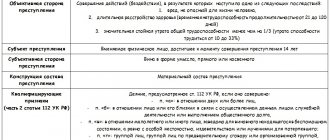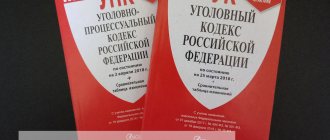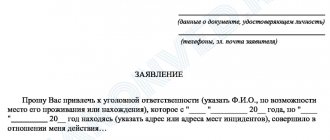The Supreme Court of Russia protected the human right to self-defense
The case of Tatyana V. from the Volgograd region should be a lesson for all lower authorities. She was completely acquitted in the Supreme Court of Russia, although three instances had previously found her guilty of seriously injuring her husband. During an argument, she stabbed her husband in the chest.
As the defense says, R.’s husband, “being in a state of alcoholic intoxication, in front of her young daughter, using a far-fetched excuse, attacked her, used physical force, began to choke her, and at that moment she accidentally stabbed R..”
Lawyers especially note that at the time of the attack the woman already had a knife in her hands, which she used to cut bread. “At the moment when Tatyana V. was cutting bread on the table with a knife, R. turned her to face him, pressed her neck with the wrist of his left hand, and with his right hand struck two blows in the shoulder area, causing physical pain,” the Supreme Court retells the circumstances of the case.
In response, the woman stabbed her husband in the chest. He survived. All these are facts confirmed by the court, which are not disputed by the party. That is, the defendant did not grab a weapon and certainly did not attack her husband with a knife.
But when hands are squeezing around your neck, you don’t always find the strength to put dangerous objects aside and try to somehow resolve the matter peacefully. Should I be judged for failing to save myself without shedding the blood of my attacker?
As the Pravo.Ru portal notes, according to the Volgograd Regional Court, R.’s actions did not threaten the woman’s life, since he was not armed. Therefore, all lower courts considered that the woman exceeded the permissible limits of self-defense. However, this approach contradicts the legal positions of the Supreme Court of Russia.
RG experts explain the legal aspects of self-defense in the “Legal Consultation” section
"IN. stabbed R. when the victim attacked her, trying to defend herself from his unlawful actions, including those related to pressing on her throat. At the same time, V.’s testimony was recognized as reliable that as a result of squeezing her throat, she began to choke and realized that she could not escape, and therefore hit the victim with a knife when she tried to push him away, the Supreme Court of the country noted. “Meanwhile, the victim’s actions related to pressing on the throat, from which the victim began to choke, indicate a real threat to her life. V. inflicted a single blow on R. with a knife precisely at the moment of real danger to her life in order to save herself.”
A few years ago, the plenum of the Supreme Court of Russia adopted a special resolution clarifying the rules of self-defense. The main rule: you can protect your life by all means. The right to defense is given not only by an attack, but even by the threat of life-threatening violence.
Let's say an attacker waves a pistol and shouts that he will shoot you now. If the situation is serious, the court will support the one who risked defending himself. Sometimes a threat arises so unexpectedly that a person does not have time to assess the danger. In this case, even tough self-defense will be justified.
As the plenum explained, courts should take into account the time, place, setting and method of the attack. The state of fear, fear, confusion at the time of the attack can also become an excuse for the one who defended himself. In fact, the document gave citizens carte blanche to protect their lives. Now, when considering specific cases, the Supreme Court confirms precisely these legal positions.
The woman was completely acquitted. She has been recognized as having the right to rehabilitation.
According to the country's Supreme Court, the current legislation on self-defense is already quite sufficient. Now it is important that practitioners—investigators, state prosecutors, lower judges—be imbued with the idea that human life is priceless. And when defending it, it is better to get excited and survive than to become timid and die.
In this case, the Supreme Court once again reminded: in accordance with Article 37 of the Criminal Code of the Russian Federation, it is not a crime to cause harm to an attacker in a state of necessary defense, that is, when protecting the person and rights of the person defending himself from a socially dangerous attack, if this attack was associated with violence, dangerous to the life of the defender or another person, or with an immediate threat of such violence.
Excess of self-defense - Article 114 of the Criminal Code of the Russian Federation
The extent of liability for exceeding self-defense depends on the consequences. Article 114 of the Criminal Code of the Russian Federation considers cases of causing serious harm to the health of an attacker or harm of moderate severity. The sentence under this article does not exceed 1 year.
The following is acceptable as punishment:
- imprisonment for a maximum of one year;
- corrective or forced labor for a period of up to one year.
Correctional labor takes place at the place of employment of the accused, and forced labor is considered a substitute for imprisonment. For forced labor, a person is sent to a correctional center. Such a center may be located in another region.
According to Article 50 of the Criminal Code of the Russian Federation, during correctional work, the state withholds from 5 to 20% of the convict’s salary.
Jobs cannot be assigned:
- pregnant women;
- women who have children under 3 years of age;
- military personnel;
- disabled people of group 1.
If a convicted person deliberately evades correctional labor, the court has the right to sentence him to forced labor or imprisonment. When it turns out that the harm to health was caused intentionally, the sentence can be up to two years.
Acceptable actions of self-defense under Article 114 of the Criminal Code of the Russian Federation are those that do not entail serious bodily harm to the attacker. There will also be no punishment if slight harm to the offender’s health is caused.
Conditions for exemption from liability
Even if the limit of permissible measures in self-defense is exceeded, then if the actions that resulted in the death or serious injury of the attacker were carried out through negligence, the citizen is exempt from criminal prosecution. It is worth considering that in order to remove responsibility, a number of investigative actions are carried out aimed at accurately clarifying the chain of actions of all parties to the incident.
Death due to negligence is not classified by the Criminal Code of the Russian Federation as murder. The form of guilt here is inaction or unintentional actions. Article 109 of the Criminal Code of the Russian Federation provides for penalties for this crime in the form of imprisonment or forced labor. https://lexconsult.online/8228-prichinenie-smerti-po-neostorozhnosti
Let's consider here harm to health due to negligence
Let's give an example: a woman was attacked on the street by a man with the intention of taking her purse. The lady was not at a loss and pushed the attacker away. He slipped on the wet asphalt, fell, hit his head on the edge of the curb and died. It is obvious that such consequences of self-defense measures were not premeditated; the death of the attacker occurred due to a combination of circumstances. This was discovered during an investigative experiment, as a result of which no criminal case was initiated.
Conditions for the admissibility of self-defense
Important information!
In case of a threat from your husband, neighbors or a stranger on the street, you should maintain presence of mind and not panic. In the event of violent acts, panic can develop into a state of passion and then the consequences will be irreversible. In this article we will tell you what to do in the event of a threat of physical harm.
In order to avoid abuse of self-defense measures, the legislation provides for criminal liability for exceeding their admissibility.
Obviously, the limits of admissibility can only be determined by the adequacy of protective measures to the actions of the attacking party. The more serious the threat to health and life, the stricter self-defense measures can be. For example, in response to a blow from an offender, defense with a knife or other weapon is unacceptable.
Exceeding the limits of necessary defense are situations in which the damage caused to the health and life of the attacker exceeds the danger of his attacks. For example, a citizen with a knife ran up to a passerby on the street and demanded money. The passer-by managed to knock out and intercept the knife from the attacker’s hands, then he used the same knife to stab the offender. There is an excess of permissible self-defense.
Conditions under which self-defense is considered permissible:
- lack of intentionality in protecting oneself from the offender;
- the presence of a real danger of harm to health, life or property. It does not matter in what form this danger exists at the moment: in the form of a threat or a completed action. For example, there is no need to wait until the attacker strikes his first blow, it is enough that he swings;
- the proportionality of the defense's response to the actions taken by the attacker;
- timeliness of self-defense actions, i.e. all measures taken within the framework of self-defense must be carried out from the moment the physical assault begins until the moment it ends, i.e. when the offender is potentially dangerous, but not when he is no longer able or unwilling harm your victim.
Official website of the Supreme Court of the Russian Federation
When considering cases of crimes against life and health, courts should take into account the behavior of the victim, explains the Supreme Court of the Russian Federation.
The Criminal Code considers it legitimate to protect against attempts to commit violent acts, therefore, if the victim behaved more actively and aggressively, then it is necessary to take into account that his actions posed a danger to the accused and qualify the actions of the defendant accordingly, the highest authority indicates.
The crux of the matter
A resident of Udmurtia was sentenced to 8 years in prison for premeditated murder and causing grievous bodily harm, and the appeal court increased the punishment to 10 years in prison. The Sixth Court of Cassation agreed with the need to increase the sentence.
But the Supreme Court of the Russian Federation not only did not support the position of its colleagues, but also reclassified the actions from murder to exceeding the limits of self-defense, reducing the punishment to 3 years and 10 months of imprisonment, and therefore the accused was released, since he had already served this sentence.
Position of the Armed Forces
During the trial, the defense consistently argued that the accused acted in a state of necessary self-defense; the lawyers presented the same arguments in their cassation appeals.
The verdict states that the defendant stabbed one victim multiple times, who died, and the second, who received serious bodily harm.
At the same time, the court found that the cause of the conflict between the parties was the unlawful actions of the victim, who wanted to steal the sewing machine of the defendant’s mother and even took it out into the corridor, and when the owner of the house reprimanded him, the victim got involved in a fight, and only then did the defendant take up the knife . The second victim tried to stop the conflict.
However, the court of first instance concluded that there was no real threat to the life of the accused: “the victim did not have weapons or objects that he could use as such, his anthropometric data also do not give reason to believe that the deceased could pose a real threat to the life of the defendant, due to the lack of any significant physical superiority over the opponent by any of the fighters.”
Meanwhile, the district court did not discuss the issue of the presence of a threat to the defendant’s health and this aspect was not assessed in the verdict, the Supreme Court points out.
Meanwhile, the provisions of the Criminal Code provide for the possibility of protection from an attack that is not associated with violence dangerous to the life of the defender or another person or with an immediate threat of such violence (Part 2 of Article 37 of the Criminal Code of the Russian Federation).
“Such defense is lawful if it does not exceed the limits of necessary defense, that is, deliberate actions that are clearly inconsistent with the nature and danger of the attack,” notes the Supreme Court.
He also recalls the instructions of the Plenum: an encroachment, protection from which is permissible, should be understood as the commission of socially dangerous acts involving violence that is not dangerous to the life of the defender or another person. For example, beatings, causing minor or moderate harm to health, robbery committed with the use of violence that is not dangerous to life or health, the Supreme Court specifies (resolution of September 27, 2012).
In the case under consideration, the accused also received numerous injuries during the fight with the victim, including four broken ribs.
Thus, the Supreme Court believes, during the fight, “the actions of the victim were more active in comparison with the actions of the convict, he struck more blows to the accused and with significant force of blows, causing moderate harm to his health.”
“Under such circumstances, the court’s conclusion that the victim did not have physical superiority, that his actions did not pose any danger to the accused and that the latter had no reason to defend himself from the victim cannot be considered justified,” explains the Supreme Court.
At the same time, assessing the defendant’s use of a knife, with which he inflicted at least 33 blows on the unarmed victim, the Judicial Panel comes to the conclusion that the method of defense he chose clearly did not correspond to the nature and danger of the assault.
In connection with this, the highest authority reclassified the actions of the defendant as part 1 of Article 108 of the Criminal Code of the Russian Federation.
The Supreme Court also did not agree with the decision to toughen the punishment for the episode of causing grievous bodily harm to the second victim. Intensifying the punishment for this crime, the board in the appeal ruling did not indicate the reasons for the decision; it only follows that the court takes into account the nature and degree of public danger of the crimes committed, the circumstances of their commission, data established by the court about the identity of the convicted person, his young age, mitigating and other circumstances influencing the imposition of punishment, the absence of aggravating circumstances, the impact of the imposed punishment on the correction of the convicted person and the living conditions of his family.
“Thus, the judicial panel referred to the same circumstances as the court of first instance, additionally pointing to his young age at the time of the commission of the crime.
There are no other reasons for the need to impose a more severe punishment, or any specific data to substantiate this decision in the appeal ruling.
Given such data, the conclusion of the judicial panel about the excessive lenity of the imposed punishment cannot be considered justified,” notes the Supreme Court.
As a result, the highest court commuted the defendant's final sentence to 3 years and 10 months in prison and ordered his release from the correctional facility upon completion of this term.
Alice Fox
Sentence reclassified from Part 1 of Article 111 to Part 1 of Article 118 of the Criminal Code of the Russian Federation
Every year, investigative authorities initiate and send to the courts tens, if not hundreds, of thousands of cases related to harm to health. Such cases (Articles 111, 112, 115 of the Criminal Code of the Russian Federation) are perhaps among the most common in the general array of criminal statistics.
In such cases, as well as in other criminal cases, a number of circumstances are subject to clarification, which are important to take into account when qualifying the actions of the perpetrator and, depending on the presence or absence of which, the act will be punished under a different rule of law, or will not be punished at all. So, for example, in addition to Article 111, the Criminal Code of the Russian Federation has other “special” norms related to the infliction of grievous harm to health: Art. 113, 114, 118, clause “c”, part 4 of article 162, clause “c” of part 3 of article 163, 264 of the Criminal Code of the Russian Federation, etc.
Thus, despite the fact that all of the above provisions of the law are united by causing consequences in the form of grievous harm to the health of the victim, they are all divided into different articles, chapters and sections of the Special Part of the Criminal Code of the Russian Federation. All of the above crimes, despite the similarity of the criminal result, differ in other elements: the method of committing the act, the direction of the criminal intentions of the perpetrator, his motives, the goals of the criminal actions, etc. Accordingly, the punishment specified in the sanction of a specific article of the Criminal Code of the Russian Federation depends on all of the above, as well as on other specific circumstances. Thus, the perpetrator under Part 1 of Article 111 of the Criminal Code of the Russian Federation may be sentenced to 8 years in prison, while, for example, the sanction of Part 1 of Article 118 of the Criminal Code of the Russian Federation (causing grievous harm to health through negligence) does not provide for imprisonment at all. In this regard, the question of particular relevance is: how to reclassify Article 111 of the Criminal Code of the Russian Federation to Article 118 of the Criminal Code of the Russian Federation or another article with a less severe punishment.
Despite the obvious external differences in acts associated with causing grievous harm to human health, in practice there are often cases of errors in the qualification of acts that occur not only during the investigation, but also in the courts. And if we take into account that in “borderline” situations, investigators, as a rule, qualify the actions of the accused under the article providing for the most severe punishment, then the delimitation of Article 111 of the Criminal Code of the Russian Federation from more privileged elements of the crime requires serious work by the defense to defend their legal rights to all stages of criminal proceedings - from the moment of its initiation until the pronouncement of a verdict that suits the defense.
As an example, we can cite the case against Kramarenko Yu.V. (surname changed - author's note), in respect of whom the verdict of the court of first instance was held under Part 1 of Article 111 of the Criminal Code of the Russian Federation.
The circumstances of the case are not exceptional and are quite banal: Kramarenko Yu.V. got into an argument with an acquaintance and punched him twice in the face. The victim fell from the blow, hit his head and lost consciousness. A forensic medical examination determined that he suffered serious harm to health caused by blunt head trauma resulting from hitting his head on the road surface. The victim was immediately taken to the hospital and received the necessary medical assistance. As part of the immediately initiated criminal case, the suspect was immediately taken into custody. The investigator qualified the actions of the accused under Part 1 of Article 111 of the Criminal Code of the Russian Federation, and rejected all statements and petitions of the lawyer and his client to reclassify the actions of the accused from Part 1 of Article 111 of the Criminal Code of the Russian Federation to Part 1 of Article 118 of the Criminal Code of the Russian Federation. The judge who considered the case acted in a similar manner, who found the defendant guilty of committing the act provided for in Part 1 of Article 111 of the Criminal Code of the Russian Federation and sentenced him to 3 years in prison.
In the appeal, in the court of second instance, in the judicial investigation and debate, the defense managed to substantiate and prove that the intent of Kramarenko Yu.V. was not aimed at causing grievous harm to the victim’s health, and the victim’s head injury, which directly caused grievous harm to his health, was an unexpected consequence of his actions for the accused, which he had no opportunity to foresee. For this purpose, a number of experts and witnesses were questioned in the case, and the attention of the judicial panel was drawn to a number of circumstances that the court of first instance did not take into account.
Ultimately, the appellate court agreed with the defense’s arguments about the need to reclassify the defendant’s actions from Part 1 of Article 111 of the Criminal Code of the Russian Federation to Part 1 of Article 118 of the Criminal Code of the Russian Federation and issued a new sentence against Yu.V. Kramarenko. The appeal verdict of the actions of Kramarenko Yu.V. were reclassified from Part 1 of Article 111 of the Criminal Code of the Russian Federation to Part 1 of Article 118 of the Criminal Code of the Russian Federation, that is, for careless infliction of grievous bodily harm. The convict was sentenced to restriction of freedom, which he had already served while in custody before the appeal verdict in the case.
Court verdict with reclassification of Part 1 of Article 111 of the Criminal Code of the Russian Federation to Part 1 of Article 118 of the Criminal Code of the Russian Federation (extracts):
- Share on facebook
Added 08/22/2016 | Litigation practice, Criminal cases
Examples from judicial practice
Example one: robbers armed with pistols tried to break into the house of I.’s family. Head of the family gr. I., after the attackers shot at the door, took his hunting rifle and fired twice through the door towards the robbers. The criminals did not expect resistance, so they did not hide. As a result, one of the robbers was killed and the other was wounded. The neighbors called the police. After the investigative proceedings, self-defense measures were found to be justified and Mr. I. was not prosecuted.
Example two: late in the evening on the street to gr. A. got attached to the drunken gr. P. demanding to give up money and phone. At the same time, he waved a baseball bat and used obscene language about the gr.’s appearance. A. Having flared up, gr. A. struck the drunken brawler, knocked him down and began to strike him numerous times. He stopped the beating only after the intervention of passers-by. Without regaining consciousness, Mr. P. died. Against gr. A. a criminal case was initiated under Art. 108.1 and a penalty of imprisonment for 2 years was applied.
A specialist will answer your questions in the comments to the article
Let us consider several typical cases of exceeding the limits of necessary defense
Two sisters from Buryatia were drinking alcohol at home. Under the influence of alcohol, one of them began to express her complaints to her sister, then began to beat her, including with a chair. Trying to defend herself, the second woman stabbed her relative, causing her harm. Subsequently, the women reconciled, the accused provided financial assistance to the victim. As a result, the court found the woman guilty of committing a crime under Part 1 of Article 114 of the Criminal Code of the Russian Federation and gave her a suspended sentence of 8 months with a probationary period of 1.5 years.
And one more thing.
A resident of Kamchatka, defending herself and her children from violence from her husband, stabbed him in the chest. Initially, the court sentenced the woman to 8 months of suspended imprisonment under Part 1 of Article 114 of the Criminal Code of the Russian Federation, but the prosecutor’s office appealed this verdict. The higher authority took into account the positive characteristics of the convicted person, the low severity of the crime and the fact that she committed this unlawful act for the first time. As a result, the sentence was revised, and the woman was sentenced to restriction of freedom for a period of 7 months.
As we can see, the final punishment greatly depends on the judge’s personal perception of a particular situation. The problem is complicated by the fact that the institution of necessary defense has a lot of evaluative concepts, such as “obviousness”, “encroachment”, “compliance of protection with the nature and danger of the attack”, etc. A competent lawyer can build a line of defense in such a way that the judge will have no doubt about the citizen’s innocence in exceeding the limits of necessary self-defense.
A good result may also be a non-custodial sentence and a fine instead of punishment. However, the specific result will depend on the circumstances of the case and the level of professionalism of the lawyer providing legal assistance.
Responsibility by article
It also makes sense to mention the articles under which the court case will be held. If a person, while defending himself, deprived another of his life, then the most loyal article, the punishment under which he will ultimately serve, is the previously mentioned Article 108. The court, unfortunately, resorts to it quite rarely.
If self-defense and excess of its measures have not been proven, then the accused can be convicted under Article 105 of the Criminal Code of the Russian Federation “Murder”, the punishment for which is imprisonment from 6 to 15 years. There have been precedents when the accused was punished under Article 111 of the Criminal Code of the Russian Federation - intentional infliction of grievous harm, which is punishable by imprisonment for up to 8 years.
What to do if you are beaten on the street.
Excess of self-defense resulting in death - Article 108 of the Criminal Code of the Russian Federation
If an attacker is killed during self-defense, liability is provided under Article 108 of the Criminal Code of the Russian Federation.
Excess of self-defense resulting in death is punishable by imprisonment, as well as correctional or forced labor. The sentence in this case can reach two years.
For murder that occurred during the arrest of a criminal, the same penalties are provided, but for up to three years.
A murderer will not be punished under Article 108 of the Criminal Code of the Russian Federation if:
- a real attack was made on a citizen and he was forced to defend himself;
- the murder was committed in a state of passion.
If the crime is recognized as murder by negligence, then punishment may be avoided depending on the decision of the court.




